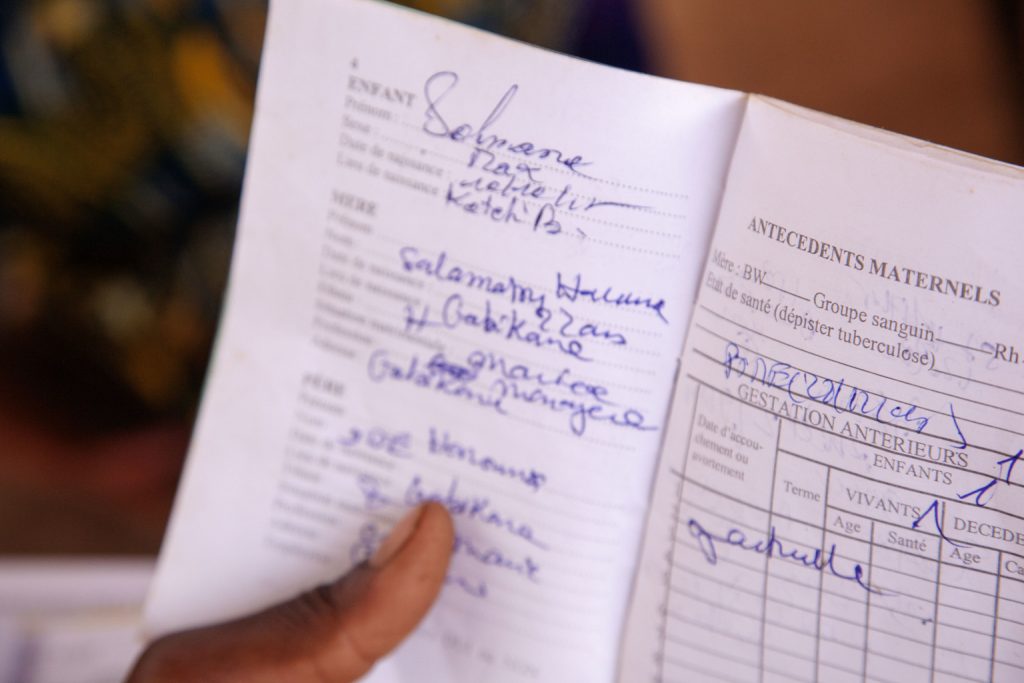Risk communication officers from the Expanded Programme on Immunization (EPI) at the national and provincial level conducted briefing sessions on the coordination and preparation of campaign activities for district chief medical officers, and provided coaching in techniques to encourage social mobilization and community engagement.
Article
Community mobilization and engagement accelerating ahead of yellow fever prevention campaign in Kinshasa
Regions
West and Central Africa
A mother holds an immunization record, which is given to every child at birth so that health workers can ensure a child is receiving the necessary vaccines in a timely manner, during a polio vaccination drive in Toutou village, Dosso District, Niger, Thursday, 14 April, 2016. The majority of the population in Niger lives far from health facilities. Health outreach programs are organized in order to provide health services to people living in the most remote areas. The health workers travel to a designated locality on a specific date to perform vaccinations and prenatal checkups, with residents situated within a 17-kilometer radius informed in advance. This strategy has increased the vaccination coverage in the area, which now stands at 98%.
Niger is no longer poliovirus-infected, according to the Global Polio Eradication Initiative, but remains at high risk of outbreaks. Detection of wild poliovirus type 1 (WPV1) in 2016 in north-eastern Nigeria means the entire region is currently at risk. Niger, along with other countries of the Lake Chad sub-region, declared the outbreak to be a regional public health emergency and is implementing a regional outbreak response, coordinated with neighbouring countries.
Polio is spread through person-to-person contact. When a child is infected with wild poliovirus, the virus enters the body through the mouth and multiplies in the intestine. It is then shed into the environment through the faeces where it can spread rapidly through a community, especially in situations of poor hygiene and sanitation. If a sufficient number of children are fully immunized against polio, the virus is unable to find susceptible children to infect, and dies out.
In Niger, the majority of the population lives far from health facilities. In order to provide health services to people living in the most remote areas, health outreach programs are organized. Health workers travel to designated villages to perform vaccinations and prenatal checkups. Villa
Related content
Case study
SSHAP learning note: Building a localised approach
This learning note shares insights, experiences and lessons from SSHAP's approach to the localisation of its operational responses in sub-Saharan Africa.
Central and East Africa Hub
West Africa Hub
SSHAP
2025
Evidence review
Rapid evidence synthesis: Mpox community protection
This note presents a rapid synthesis of evidence related to community protection in countries affected by the mpox clade 1b outbreak. Synthesising evidence related to community protection for mpox Medline, Africa Journals Online and Global Index Medicus were searched. IFRC,…
SSHAP
2025
Report
Meeting report: The impact of global aid funding cuts on people and programmes in South Sudan
Report of a roundtable with government actors, academics, development partners and journalists in South Sudan on the sweeping impacts on people and programmes of aid cuts and multiple, intersecting crises.
Central and East Africa Hub
SSHAP
2025
Briefing
Key considerations: Home-based care for mpox in Central and East Africa
This brief outlines key considerations on health system requirements for safe and inclusive home-based care for mpox.
Central and East Africa Hub
SSHAP
2025


